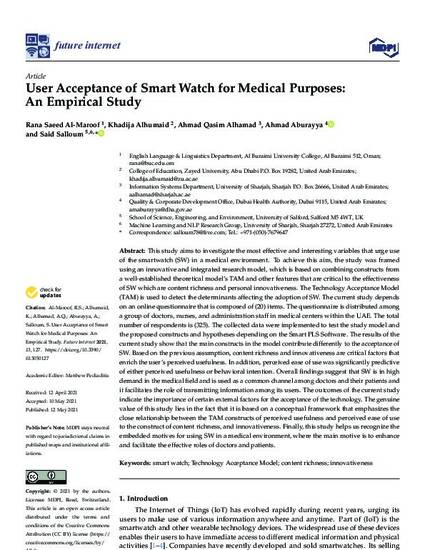
This study aims to investigate the most effective and interesting variables that urge use of the smartwatch (SW) in a medical environment. To achieve this aim, the study was framed using an innovative and integrated research model, which is based on combining constructs from a well-established theoretical model’s TAM and other features that are critical to the effectiveness of SW which are content richness and personal innovativeness. The Technology Acceptance Model (TAM) is used to detect the determinants affecting the adoption of SW. The current study depends on an online questionnaire that is composed of (20) items. The questionnaire is distributed among a group of doctors, nurses, and administration staff in medical centers within the UAE. The total number of respondents is (325). The collected data were implemented to test the study model and the proposed constructs and hypotheses depending on the Smart PLS Software. The results of the current study show that the main constructs in the model contribute differently to the acceptance of SW. Based on the previous assumption, content richness and innovativeness are critical factors that enrich the user’s perceived usefulness. In addition, perceived ease of use was significantly predictive of either perceived usefulness or behavioral intention. Overall findings suggest that SW is in high demand in the medical field and is used as a common channel among doctors and their patients and it facilitates the role of transmitting information among its users. The outcomes of the current study indicate the importance of certain external factors for the acceptance of the technology. The genuine value of this study lies in the fact that it is based on a conceptual framework that emphasizes the close relationship between the TAM constructs of perceived usefulness and perceived ease of use to the construct of content richness, and innovativeness. Finally, this study helps us recognize the embedded motives for using SW in a medical environment, where the main motive is to enhance and facilitate the effective roles of doctors and patients.
- Content richness,
- Innovativeness,
- Smart watch,
- Technology Acceptance Model
Available at: http://works.bepress.com/khadija-alhumaid/1/
